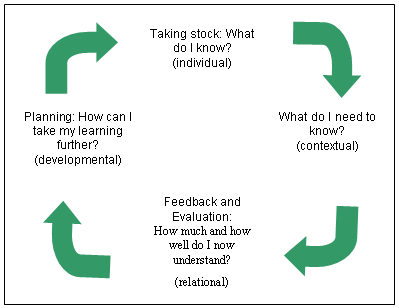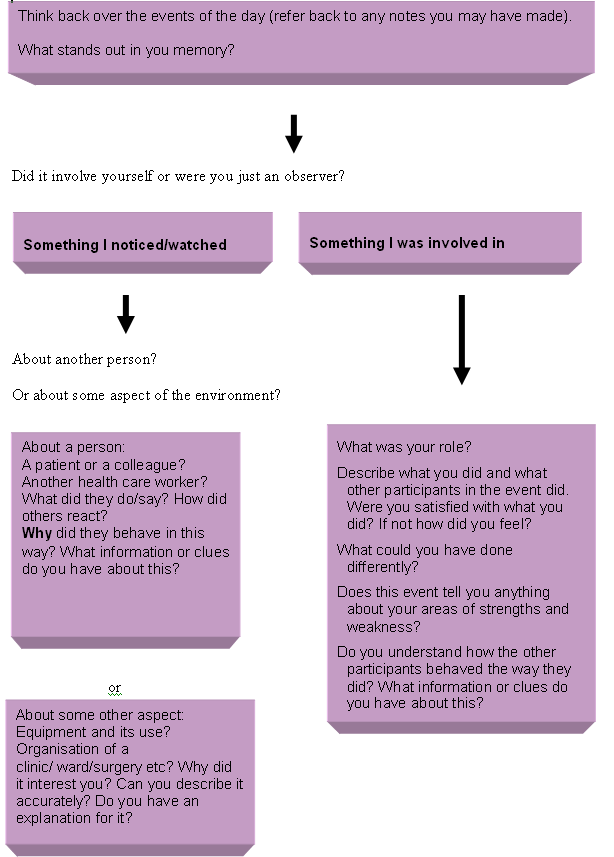Reflective practice
Why reflect?
'It is not sufficient simply to have an experience in order to learn.
Without reflecting upon this experience it may quickly be forgotten, or its learning potential lost. It is from the feelings and
thoughts emerging from this reflection that
generalisations or concepts can be generated.
And it is generalisations that allow new situations to be tackled effectively.'
(Gibbs 1988)

Reflection deepens learning. The act of reflecting is one which causes us to make sense of what we've learned, why we learned it, and how that learning took place. Reflection also allows us to widen learning by linking theory and practice. It is also useful in success and failure, prompting us to provide evidence of our perceived achievements and also allowing us to provide insights into our failures and how this situation may be avoided for future practice.
'it is increasingly recognised that reflection is an important transferable skill, and is much valued by all around us, in employment, as well as in life in general. The ability to reflect is one of the most advanced manifestations of owning - and being in control of - a human brain. Have you reflected today? Almost certainly 'yes!'. But have you evidenced your reflection today? Almost certainly 'sorry, too busy at the moment'. And the danger remains that even the best of reflection is volatile - it evaporates away unless we stop in our tracks to make one or other kind of crystallisation of it - some evidence.'
(Race 2002)
![]() Take a few minutes to consider the benefits of reflective practice and also the barriers that can prevent us from doing this.
Take a few minutes to consider the benefits of reflective practice and also the barriers that can prevent us from doing this.
Reflection is increasingly required in education and employment. More specifically, evidence of reflection is required, for students with regard to assessments in the form of professional development portfolios where reflection is supported by learning logs, records of achievements and personal development plans. This has also become a requirement or expectation of employment. Teaching staff are also required (or encouraged) to build up records of their reflection on their developing work associated with teaching, learning and assessment, so that they develop their practices in a more efficient and focused way than if they simply left reflection to chance;
The encouragement of the ability to reflect in action (while doing something) and on action (after you have done it) is an important feature of professional practice education. Its encouragement is seen as a particularly important aspect of the role of the practice educator. Arguably constructive and effective, reflective practice needs another person as mentor or professional supervisor, who can ask appropriate questions to ensure that the students does not immersed in their own self justification or self pity. Reflection involves a dialogue between students and their peers, students and teachers and students and work placement tutors, all of whom can provide useful feedback necessary for reflection. To begin to reflect on their learning students need to be encouraged to make sense of new knowledge in relation to their existing understanding. The learning cycle developed by Kolb (1984) is a useful and simple tool for illustrating to students the connection between reflection and improved learning:
In summary, we can view reflection as having four main purposes (figure 1)
Figure 1: The purpose of reflection

Reflection helps learners to:
- understand what they already know (individual)
- identify what they need to know in order to advance understanding of the subject (contextual)
- make sense of new information and feedback in the context of their own experience (relational)
- guide choices for further learning (developmental)
Individuals often reflect on what they have done, but these are private and personal thoughts used to shape ideas. The main difference between this and formalised 'reflective practice' as a tool for supporting learning is that the student produces evidence of their reflection. This can be demonstrated in the form of a learning log, diary, personal development portfolio, critical incident journal or perhaps a video diary. Individuals engaged in this structured, evidence-based activity may be described as 'reflective practitioners'.
The learning cycle can be used to explain the incremental nature of the learning process. In professional and vocational education reflection can be used as a way of helping students to take responsibility for their own learning and to identify ways in which they can advance their practice and professional conduct. Academic programmes also emphasise autonomous learning and encourage students to develop a sense of ownership over work by reflection and planning. In both spheres use is made of learning journals and reflective logs to support learning and skill development. These 'products' provide evidence of thinking, and therefore validate reflection within the context of formal education. People reflect for different purposes and in different contexts, but the aim is the same: to understand better and make sense of what is felt and experienced. Individuals often reflect on what they have done, but these are private and personal thoughts used to shape ideas. The main difference between this and formalised 'reflective practice' as a tool for supporting learning is that the student produces evidence of their reflection. This can be demonstrated in the form of a learning log, diary, personal development portfolio, critical incident journal or perhaps a video diary. Individuals engaged in this structured, evidence-based activity may be described as 'reflective practitioners'.
Principles of reflection
- Focuses on the practitioner and their practice
- Allows us to use, value and learn from experience
- Allows us to be empowered to act based on this knowledge
- Knowledge generated is often context specific and provides valuable insight into local problems
- Does not separate theory from practice, instead adds to the theoretical base
- Can take different forms, some more 'soft' and subjective, others more critical
- It does involve the practitioner developing themselves in a systematic way
- Reflective practice should be informed by practitioner led research and does involve respecting and working with evidence.
Aims of reflection
- Create personal records
- Monitor professional practice education and progress
- Self reflect
- Self-evaluate
- Plan personal objectives
- Encourage the student to take an active part in his or her own learning.
- Encourage the student to reflect on professional practice and experiences
- Identify their own learning needs and style and to set personal learning outcomes
- Allow the student, clinical tutor and professional education co-ordinator to monitor and evaluate individual learning
- Provide evidence that learning has taken place
- To promote self awareness as part of personal growth and professional development
Clinical events and reflective reports
Reflection on practice plays a major role in expanding our knowledge base and bringing together theory and practice. It is a tool for learning that has to be practiced: not everybody is naturally good at reflection. But it relies heavily on self-awareness, honesty and openness. The following guidelines have been written to support developing a reflective log.

Guidelines for recording clinical incidents
Accounts should be written as though writing a diary entry or describing the incident to a friend. The event needs to be written as soon as possible and also theanonymity preserved of all those concerned in the event.
Description of the event should include the following:
- Detailed description of what happened, including when and where
- Why the event is of importance to you
- What you were thinking at the time i.e. during and after
- What were your concerns at the time
- Action / interventions taken by others
Examples of reflections
- Examples of effective/ineffective communication
- Was intervention by another member of staff necessary? If so why?
- Was the event a positive experience for you / patient?
- How did you feel during and after the event?
- What have you learned from the event?
- How might your future clinical practice be influenced by the event?
Examples of clinical events may include:
- Events that led you to understanding a particular procedure/equipment/communication
- Events that led you to try and find out about a particular procedure/equipment/communication
- Events that impressed you because you felt that they were examples of good clinical practice
- Events that you felt were not good clinical practice
- When events did not go according to plan and how the problems were resolved
- Actions taken by practitioners that made a significant difference to patient care / management
- Actions / events that were particularly demanding
According to Boud, Keogh and Walker (1985):
'Reflection is an important human activity in which people recapture their experience, think about it, mull it over and evaluate it. It is this working with experience that is important in learning'
To be a successful reflective practitioner, reflection must be accompanied by action.
References
Boud, D, Keogh, R, Walker D, 1985, Turning Experience into Learning. Kogan Page.London
Gibbs, G. Rust, C. Jenkins, A. Jaques, D. 1994, Developing Students' Transferable Skills. Oxford Centre for Staff Development.
Kolb, D. 1984, Experiential Learning: Experience as the Source of Learning and Development, Prentice Hall, New Jersey
Race, P (2002) Evidencing reflection: putting the 'w' into reflection (ESCALATE Learning Exchange) http://www.escalate.ac.uk/exchange/Reflection